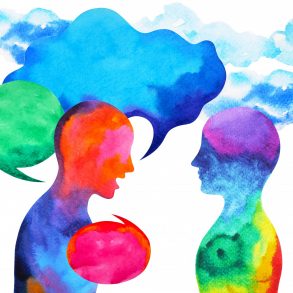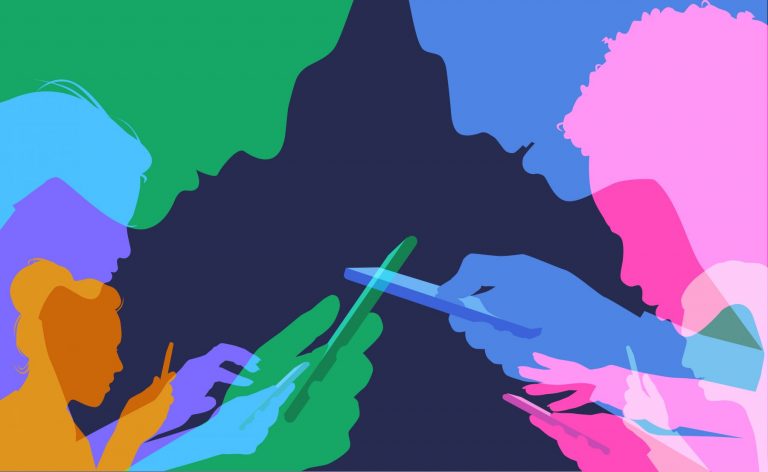Smartphones are solving so many of our day to day problems, it’s no surprise we’re looking to our phones to help combat the bigger issues, too. You may have heard of Headspace to help you meditate, but you might not have heard of Talkspace or 7 Cups of Tea — apps offering therapy at your fingertips.
I’ll admit, I was pretty skeptical of therapy apps but also curious, so I asked psychotherapist Tim Desmond to help me identify some of the best apps for teletherapy and for all-around mental health.
Desmond, a longtime student of Vietnamese Zen Master Thich Nhat Hanh, teaches psychology at Antioch University, and he recently led a research project at Google focusing on just this type of peer counseling.
He says these apps are, in effect, reducing the cost of a typical in-person therapy session by replacing it with text messaging that may, or may not, include live video or phone sessions.
The apps solve two big problems: They make therapy more affordable, plus they make it more accessible to people in areas where it isn’t readily available. Even better: It’s generally more convenient then driving to an appointment.
“Talkspace and BetterHelp are the two major apps that are trying to make therapy more affordable using licensed therapists,” says Desmond, the author of How to Stay Human in a F*cked Up World. “The average price of (outpatient) therapy is $150 in many cities, and up to $250 in places like New York or San Francisco,” he said.
Talkspace
Just like you might text a friend, Talkspace allows you to send messages to a licensed therapist. While you have unlimited messaging, that doesn’t mean your therapist will respond right away.
For example, I chose Traci, who has a master’s degree in marriage and family therapy, because I wanted to talk about my parents’ divorce.
Traci was incredibly empathetic and asked a lot of questions. The only problem with this type of message-based exchange is that it took a while to get a response. For example, I messaged Traci at about 5.45 p.m. and the app responded, “Traci has been notified. Expect a reply by 11 p.m.” By the time Traci responded at around 10.30pm, I had forgotten what I wanted to tell her.
Overall: I was really happy with Traci’s help. My only complaints were the lag between texts and the difficulty we faced when we tried to set up a live video session.
Cost: Talkspace starts at about $65 per week (or $260 a month) for unlimited messaging therapy — which includes text, video and audio messaging. But to be honest, I mostly just used text. If you want to add a live teletherapy session a month, it costs $75 a week, or $316 a month.
MORE: How neuroscientists says you can hack your brain to create more happiness
BetterHelp
BetterHelp uses an algorithm to choose the right therapist for you, and it also offers a discount for low-income users. The counselors are accredited psychologists, marriage and family therapists, clinical social workers or licensed professional counselors.
I really liked my counselor, June, a social worker, whom I texted with during the week and set up a live video session for the weekend. June couldn’t get the video on her phone to work, so we did a 40-minute phone session, which I found just as helpful. Unlike traditional therapy, June didn’t just listen — she gave me a lot of feedback, was warm and empathetic.
Overall: BetterHelp is a great experience worth trying.
Cost: Depending on your income and plan, the cost ranges from $40 to $70 per week (billed monthly). For $45 a week, my plan included unlimited text-based counseling and a weekly live session via phone, video or chat.
7 Cups of Tea
7 Cups bills itself as a place for those looking for emotional support for depression, anxiety and a host of other problems. It cuts down on costs by using trained listeners, although licensed therapists are available at an additional fee.
What I liked about this service is that it’s free and you can access a listener day and night who can message back and forth with you in real time.
I answered a few questions (“What’s your goal? and “If a friend felt the same way you do right now, what would you say to them to encourage them?”) and filled out an emotional wellness test that asks you to identify your main issue from a list that includes ADHD, anxiety, drug use, breakups, bullying, eating disorders, grief, getting unstuck and panic attacks. I said I was there to talk about family issues, namely, my parents’ divorce.
I was paired with a male listener in Canada. We messaged back and forth in real time, which worked much better for me. Unfortunately, my listener had no experience with divorce and suggested I speak with a licensed psychologist, promptly ending the chat by explaining, “My kid needs help. Daddy to the rescue. I have to go, Sorry, bye.”
Overall: As a free option, 7 Cups is one of the better ones, but if you have the budget, BetterHelp was more helpful and tailored to personal needs.
Cost: You can choose to chat with a listener for free, or with a licensed therapist for a $150 a month.
Happify
Happify doesn’t offer therapy. Instead, it’s a mood-training program, backed by science and some of the country’s best psychologists. This combination of games and activities improves your happiness by training your brain to think more positively.
One of the things I liked best was a questionnaire about signature strengths. I discovered my top strengths are bravery, honesty and judgement. It felt great to hear that, and I also loved playing some of the happiness games, which were surprisingly relaxing. Overall, I felt a lot better after going on Happify for 20 minutes.
Overall: I’ll definitely use this app again.
Cost: Free.
MORE: I tried 6 happiness hacks backed by science — here’s what actually worked
SuperBetter
SuperBetter is a gaming platform that helps you build resilience. That’s the ability to bounce back, stay motivated, and even optimistic, in the face of challenges. Resilience is something I’ve written about before and believe is one of the keys to happiness. This app is the brainchild of game designer Jane McGonigal, who came up with ways to stay motivated and turn her life around after she suffered a devastating concussion. This is the result of her research.
I liked SuperBetter, but the app was less intuitive to navigate than the others. I did do a couple of “power-ups,” which are easy tasks that give you a quick win. For example, I drank a glass of water.
Overall: My verdict is still out on this one. I’d recommend Happify more.
Cost: Free.









